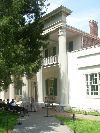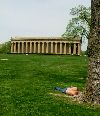Architecture
-
The Mount: Writer Edith Wharton's 1902 House
An Elegant Lenox Edwardian Estate
By: - Jul 21st, 2008The Mount was the home of the writer Edith Wharton. It was built in the Berkshire Mountains to escape what she referred to as an overstuffed and suffocating life in New York and Newport, RI. It's where she wrote some of her classic books like "The House of Mirth," where she hosted distinguished friends like Henry James, and where she put into practice her sophisticated ideas of home d�cor and garden design. It is a special place created by a special American artist. It is currently in need of creative help.
-
Thomas Jefferson's Monticello
An American Masterpiece by a Founding Father
By: - Jun 06th, 2008Our visit to Monticello, a masterpiece of American architecture in Charlottesville, Virginia evoked troubling thoughts about its creator, Thomas Jefferson, Founding Father, Third President, Man of the Enlightenment, and owner of slaves.
-
Fallingwater, Mill Run, Pennsylvania
Frank Lloyd Wright's Masterpiece Kaufmann House
By: - May 30th, 2008Fallingwater, by Frank Lloyd Wright, is widely considered as one of the greatest private residences of the 20th century. During the Great Depression is was built as a weekend retreat by the Pittsburgh businessman, Edgar J. Kaufmann, Sr. Today, the home and woodlands are owned and open to the public by the Western Pennsylvania Conservancy. Mill Run is located some 50 miles from Pittsburgh.
-
On Memorial Day
The New England Holocaust Memorial
By: - May 26th, 2008Memorial Day commemorates our fallen military. But, on this day we also think of our own lost friends and family. Remembrance and respect transcend our own personal lives. We also tend to memorialize great events and great tragedies. Grand artistic visions are rare in monuments and memorials. However, a case can be made for the New England Holocaust Memorial.
-
Adaptive Environments: Inclusive Design
Organization Uses Design as a Tool for Accessibility
By: - May 17th, 2008Universal design sensitivity is now written into law, but it was not always. Boston-based Adaptive Environments is a prominent reason that design now incorporates more sensitivity to the human condition no matter what it is. We all have disabilities.
-
Frank Lloyd Wright's Great Usonian Vision
The Zimmerman House in Manchester, NH
By: - May 10th, 2008Inspired to create a democratic, distinctively American style of house, master architect Frank Lloyd Wright created a series of homes that he called Usonian. Perhaps, the best of these was built in Manchester, NH. FLW considered this an affordable house, for middle class people. The Zimmerman House cost $55,000 to design and build in the early 1950's. This was at a time when a comparably sized house cost around $5000. But, this particular Manchester house has the Wright stuff.
-
New Orleans Reports: Balconies of the French Quarter
Unique Creole Flavored Architecture
By: - Apr 29th, 2008The wrought iron balconies of the French Quarter are a distinctive architectural element and part of the heritage of the Crescent City. Because it sits on relatively higher ground this area was spared much of the devastation of hurricane Katrina.
-
Outside Nashville, Tennessee: Andrew Jackson's Hermitage
The President of the United States Owned 140 Slaves
By: - Apr 27th, 2008A short distance from downtown Nashville is the mansion and plantation of the seventh President of the United States, Andrew Jackson. The Hermitage is a grand neo classical home and signifier of the wealth and power of one of America's most remarkable and controversial presidents.
-
Greek Architecture in Nashville's Parthenon
Athena As a Country and Western Star
By: - Apr 23rd, 2008The Parthenon is all that remains of pavilions erected to commemorate the Centennial of Nashville, Tennessee in 1897.
-
Pittsburgh, Pennsylvania: H.H. Richardson's Allegheny Courthouse and Jail
An Architectural Masterpiece
By: - Apr 22nd, 2008Visiting Pittsburgh, Pennsylvania we encountered the enormous, rusticated stone masterpiece by Henry Hobson Richardson, his last project, the Allegheny Courthouse and Jail.
-
New Museum on Skid Row
Trashy Exhibitions Launch a Permanent Home
By: - Apr 10th, 2008In keeping with its mandate for risk taking the New Museum, which was founded by Marcia Tucker in 1977, has recently opened a permanent home on the Bowery of New York.
-
Edifice Wrecks: What's With New York City?
Urban Visions are Being Ruined by Parochial Hubris
By: - Mar 29th, 2008New York is suffering from municipal malaise. Failing with plans for Ground Zero, the 2012 Olympic Bid and now Atlantic Yards in Downtown Brooklyn, NYC lacks vision and civic follow through. A few individual architecturally interesting buildings are getting built but not larger visionary urban design schemes. Politics, provincialism and perhaps fear of the new have caused America's greatest city to civically belittle itself. Why?
-
The Comfortable And Elegant Gropius House
A 1938 Bauhaus Home in Suburban Boston
By: - Feb 11th, 2008New England contains several architecturally distinctive houses. This is the first in an occasional series of articles and reports in BFA focused upon these special structures. Built in the late 1930's, Bauhaus founder and Harvard architecture professor Walter Gropius' house followed his Modernist's philosophy and principles while sensitively being company-comfortable and family-friendly.
-
WGBH's New Headquarters Building
An Innovative and Surprisingly Comfortable 21st Century Communications Structure
By: - Dec 31st, 2007Mega-PBS/NPR Flagship Station WGBH had outgrown its facilities. Harvard University wanted the land and buildings back that the station rented or was lent in order to carry out its master planned Allston neighborhood expansion. The resulting 309,000 square foot structure and its 21st Century capabilities are both impressive and elegant.
-
MIT Sues Architect Frank Gehry Over Flaws at Stata Center
Citing Major Building Flaws in $300 Million Complex
By: - Nov 07th, 2007MIT has a billion dollar plus master plan. Individual buildings were to be designed by architectural stars. One of the hottest stars, Frank Gehry, was commissioned to design the Stata Center, a combination of labs, classrooms and offices that had his "look" of jutting angles, Disney colors and unconventional materials. The problem is that the building is falling apart, causing dangerous problems in the winter and does not exactly build a positive interactive academic community on its interior. So, MIT is suing.
-
Boston's New Institute of Contemporary Art
Building as Artistic Statement.
By: - Dec 07th, 2006Another view of the new Institute of Contemporary Art written by the designer Mark Favermann. This is the first article for Berkshire Fine Arts by a former columnist for Art New England.
<< Previous
















